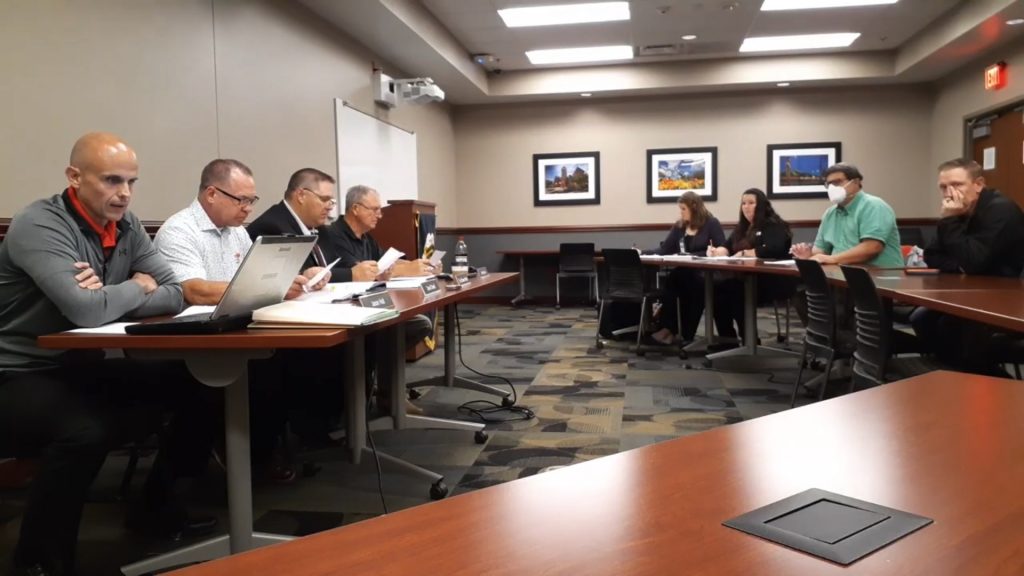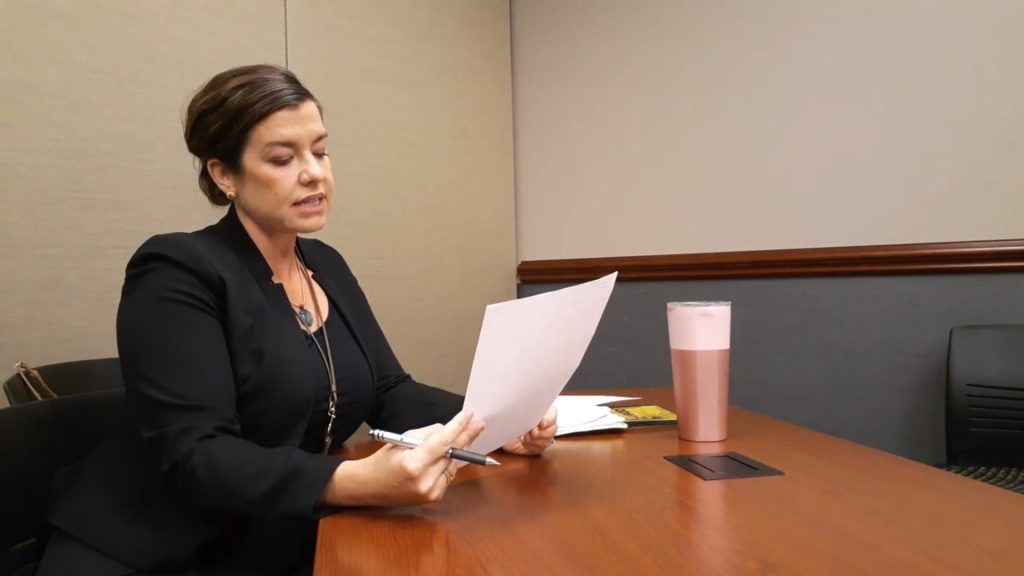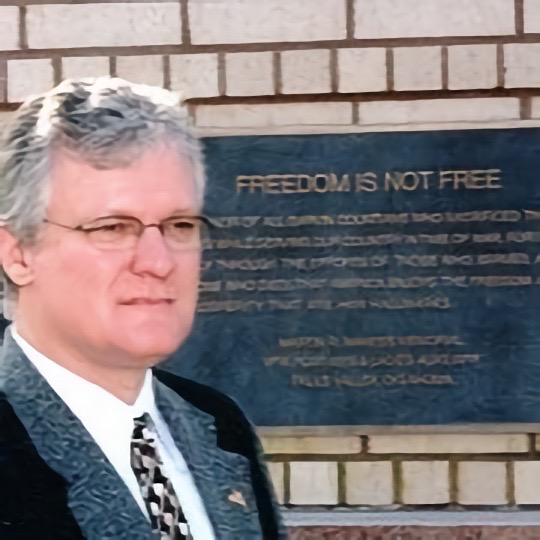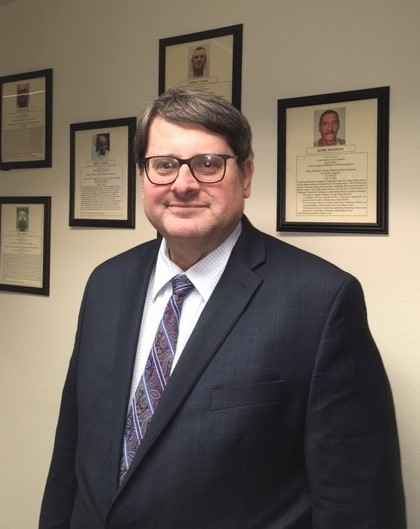James R. Kelly appears to have lied for the purpose of concealing evidence in a judicial proceeding. The Oklahoma Polygraph Examiners Board seems not to have a problem with that.
On 5 July 2021, AntiPolygraph.org co-founder George W. Maschke filed a complaint (PDF) with the Oklahoma Polygraph Examiners Board against James R. Kelly of Pauls Valley, Oklahoma concerning two polygraph examinations that Kelly administered to Benjamin Lawrence Petty.
Petty, who was on probation, in 2020 had his probation revoked and was sentenced to 15 years’ imprisonment largely on the strength of the two polygraph examinations at issue in the complaint. Kelly refused to provide Petty or his public defender with the computerized data associated with his polygraph examinations, with an audio or video recording, or with a printout of the charts. When asked for this documentation, Kelly claimed that he did not possess and did not keep such records.
Maschke, who conducted a pro bono critique and review of Kelly’s polygraph examinations of Petty, filed the complaint on the ground that, by not keeping such records, Kelly was in violation of Title 560, Chapter 10 of the Oklahoma Administrative Code, which requires at para. 1-7 that “[t]he examiner shall maintain on file for at least two (2) years all physical and/or electronic records, including audio and video tapes, papers, discs, polygraph charts, consent to examination forms, notes, question lists and reports of polygraph examinations conducted.”
Despite this requirement, Kathy Karmid, an investigator with the Oklahoma Indigent Defense System working on behalf of Petty’s public defender, stated in an affidavit that Kelly told her that “he does not make recordings or videos of his polygraphs, does not keep any clinical/therapeutic records, computerized data, notes, hand scoring or any other documentation beyond his report, and does not even retain the list of questions he asked when conducting an examination.”
The Polygraph Board assigned Oklahoma State Bureau of Investigation Special Agent and polygrapher Jonathan Santiago to investigate the complaint. Santiago served as part of a three-person review panel that also included Polygraph Board secretary Shawn Ward and Oklahoma Assistant Attorney General Thomas R. Schneider.

From left to right: Jason Holt (chairman), David Otwell, Shawn Ward, Joel Franks
On Friday, 15 October 2021, the Polygraph Board considered the complaint against James Kelly at its regularly-scheduled quarterly meeting in Edmond. Assistant Attorney General Amanda Everett, standing in for Thomas Schneider, read out a summary of the review panel’s findings.

The report stated:
On July 19th 2021, OSBI Special Agent and licensee of the board Jonathan Santiago was tasked with investigating the complaint. On September 15th 2021, the review panel, comprising of [sic] Special Agent Santiago, Special Agent Sean Ward, and Assistant Attorney General Thomas Schneider met and discussed Special Agent Santiago’s investigation pursuant to Oklahoma Administrative Code Section 560 10-1-13.1 subsection g.
The review panel did not find any violations of the Polygraph Examiners Act or its rules and regulations found in Title 560 of the Oklahoma Administrative Code. Accordingly, the review panel recommends that the state Polygraph Examiners’ Board dismiss the complaint without further action.
The report further noted that Kelly “responded to the investigation by providing Special Agent Santiago all requested materials and proof that records were retained for longer than two years.”
However, the report did not specify what materials Special Agent Santiago requested. This is a glaring omission, because the scope of records maintained by Kelly is the crux of the complaint.
Following the reading of the report, the Polygraph Board voted unanimously to dismiss the complaint.
During a public comment period at the end of the meeting, observer Randy Bauman, who is of counsel with the Oklahoma ACLU, noted:
…[i]t’s my understanding that this examiner told two or three people—I think it was at least three—that he did not have his charts, records, et cetera, when they wanted to look at them as an expert for the defense, but then when he got in a little bit of a spot because he—that would be against the Polygraph Rules—apparently, he then told investigator Santiago that he did have them.
And that —with the result that, that the defense expert did not get to review them. And I just wanted to say—and I’ll say it very respectfully, that doesn’t seem to me a good look at all for the polygraph world, and not really a very good look for the Board either.
Frankly, it doesn’t seem to me—I agree with what Chairman Holt said, that these things should be on the up and up, but that doesn’t seem on—qualified—for that aspiration. So with that, I just wanted to make sure that the board was aware that there apparently was this allegation, it’s my understanding that, um, the records weren’t there, and then they were….
Benjamin Petty’s disability assistant, Lynette Clower, also commented, asking what the process for contesting the Board’s decision is. Chairman Holt told her that any questions regarding the complaint should be addressed to Thomas Schneider at the Attorney General’s office.
Clower also noted:
I actually have documented proof and a recording of him refusing to provide Mr. Petty the information when requested, and saying that the only thing he had to keep was that paper copy. And when looking at the code and the policy, it does state that there are other records that are supposed to be kept—heart rate, all of these things—not just a paper printout saying that this is a question that was asked and the determination that the polygrapher had. There are an entire list of things that are to be kept.
Are you all saying that those things are not—are you all saying that he has met the requirements and he has actually provided all of those records, not just one little paper printout saying what his opinion is—are you saying that you have received all of those reports, that he has provided all of those reports?
Chairman Holt did not answer Clower’s question and instead referred her to the Attorney General’s Office.
On 16 October 2021, George Maschke emailed Oklahoma Assistant Attorney General Thomas R. Schneider, writing:
Dear Mr. Schneider,
At yesterday’s meeting of the polygraph board, Chairman Jason Holt directed any question regarding Complaint 2021-02 to you.
I have a question. Your colleague, Amanda Everett, apparently reading from a written report, stated, “the licensee responded to the investigation by providing Special Agent Santiago all requested materials and proof that records were retained for longer than two years.”
The report Ms. Everett read did not mention specifically what records Special Agent Santiago requested. This is a regrettable omission, because it invites doubt about the thoroughness of the investigation.
Could you let me know what materials Special Agent Santiago requested and received from Mr. Kelly?
Sincerely,
George W. Maschke, Ph.D.
AntiPolygraph.org
On Monday, 18 October, Assistant Attorney General Thomas R. Schneider replied, writing:
Good morning Dr. Maschke,
The Polygraph Examiners Board considers all investigations into its licensees confidential. Without going into the details of the investigation, the Review Panel determined that the licensee did not violate his retention duties under Oklahoma law. All records that the Board’s investigator requested to inspect during its investigation were made available to him.
Respectfully,
Thomas R. Schneider, LL.M. | Assistant Attorney General
It should be noted that nothing in the Oklahoma Polygraph Rules (PDF) makes complaint investigations confidential. On the contrary, the Rules explicitly state at Section 560:10-1-13.1(g)(4) that questions regarding complaints “may be submitted in writing to the Assistant Attorney General representing the Board following the Board meeting.” It logically follows that Schneider was authorized to answer the question put to him, but chose not to.
While searching online for Schneider’s email address (thomas.schneider@oag.ok.gov), Maschke found Schneider’s Twitter profile (@TSchneiderOK) and followed him on that website. Maschke later discovered that Schneider had blocked him.
Under Title 21, Section 21-540 of the Oklahoma Statutes, “Any person who willfully delays or obstructs any public officer in the discharge or attempt to discharge any duty of his office, is guilty of a misdemeanor.”
If Oklahoma Indigent Defense Service investigator Kathy Karmid is a “public officer” within the meaning of this statute, and James Kelly did in fact possess the records that Oklahoma law requires him to keep, then it would appear that he committed a misdemeanor (and crime of moral turpitude) when he denied possessing any data regarding his polygraph examinations beyond his written reports, all for the purpose of concealing evidence in a judicial proceeding.
We can only concur with Randy Bauman’s observation that this is not a good look, either for the polygraph world or for the Oklahoma Board of Polygraph Examiners.
For discussion of this complaint, see the message board post, Complaint Against Polygraph Operator James R. Kelly.





[…] this, on 15 October 2021, the Oklahoma Polygraph Examiners’ Board absolved Kelly of any violation of the polygraph rules. If Kelly actually did maintain all required records of his polygraph […]
Once again, we are seeing that practitioners that use polygraphs and the related voice stress analysts and Scientology e-meters are deceitful since these types of devices have no scientific basis and rely on duping the test subjects.
In the Oklahoma case of Benjamin Petty, we are seeing double speak in that the examiner claims he did not keep records, and the so-called Polygraph Examiners Board claiming he did keep records, but evidently could not produce the records.
This is really scary and reminds me of the Nazi rise to power where certain groups could be imprisoned for the convenience of the state and due process was forbidden. From my understanding, Petty could not afford adequate representation and did not want to roll the dice of a jury trial. As a retired officer of the court, I have seen this type of plea bargain many a time. Also, I am willing to bet most people reading this post have gotten a questionable traffic ticket at least one time, and went ahead and paid the fine to avoid the cost and time of a trial.
The Oklahoma polygraph people are covering their ass. No two ways about it.
To paint the big picture of the lie industry, the biggest liars are the operators and manufactures of the equipment. For instance, the Ribacoffs, perhaps the golden children of the industry have credible charges of double billing, trying to cover up their agents probable rape of a surveillance target, plus being racists to be point of ascertaining that black applicants are eliminated as recruits for the NY Transit Authority. On the VSA side, we have the two characters that both claim to the the father of the VSA touting fake doctorate degrees in addition to claiming their devices have near 100% accuracy although legitimate academic studies show the devices have the reliability of a coin flip.
The Scientology e-meter is similar to a so-called lie detector, and allows the Scientology business reportedly charge $800 an hour for an examinee. What a hustle.
Finally, these devices go against the Judeo-Christian principles of this country is that a pagan black magic device is allowed to judge guilt or innocence of a test subject. As a practicing Methodist, I avow there is no way a true Christian could be a lie detector practitioner.
Speaking from expweience, I don’t trust ANYTHING that Kathy Karmid is involed in